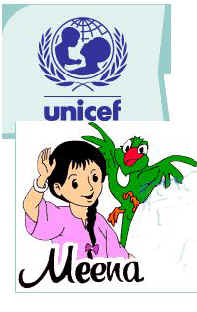|
|
|||
Vichitra Sharma portrays a work and how it changed the worker |
|||
[Come, let us tell you a story--that has neither a king nor a queen] So starts the show, to the beat of a dholak. Scores of children rush out of their huts as the adults amble along to see what the excitement is all about in heir village. A girl with a mission: 'Meena,' the heroine of a UNICEF animation series, a lovable, funny and feisty little girl who combines compassion and humour with a sharp look at the discrimination she sees towards herself, has walked out of the confines of a film-frame to give a live-show and to communicate with the rural poor of Bihar. The issues enacted by puppets highlight Meena's dream of going to school, sharing a mango with her brother, problems of child marriage, illiteracy, health and superstition, and evils of dowry. At the end there is an impromptu interactive session with the villagers on the status of women and children, or a social problem. Turning 'Meena' into a living legend in Bihar is Rupa, a young person, now in her early 20s, who has become synonymous with 'Meena' as a cult figure discussing issues and introducing new concepts and programmes in the slums, small towns and villages. Waking up boys: At Dujra slums, near Budha Colony, after the enactment of the skit "Dividing the Mango" by Rupa Singh and her group Gatividhi wearing masks, 12-year-old Babloo volunteered, " I think I should share food equally with my sister and help her as she does most of the work at home." If the little boys were becoming aware of the gender biases in family behaviour, so were little girls. When Meena came to the remote hamlet of Sitamarhi with the same performance, 8-year-old Swastika blurted, "my mother always gives me less food than my brother, saying otherwise I would grow faster than him." Two recent campaigns that spread like forest-fire in rural Bihar were the Meena movement for help in the census operations and for a polio-free Bihar.
"I am your daughter Meena. You must give full information about me. If you give me importance then only will I be respected by others", became a popular slogan in rural Bihar. Rupa discovers herself: According to Augustine Veliath, Information and Communication Officer of UNICEF, Patna, who supports the Meena campaign, "in several areas families were not coming forward with the number of girl-children. They were not considered worth mentioning. Rupa got on to her Meena chariot (a wagon with Meena's posters and slogans painted all over) singing songs and distributing handbills to attract attention in the villages and get people to cooperate with the census programme. Meena has indeed become a trusted brand-name." In four years, Meena has grown from an animation film on television to a living form of advocacy for social change. The transformation is not just Meena's. The face behind the mask- Rupa has changed too. "Meena has given me a reason to live, fight my battles and move ahead in life," says Rupa, who was thrown out of her house as a young bride because she was a 'backward' girl married to a city boy. "All I wanted was to have a better job than him and a bigger office. Today I have both. I don't suffer from an inferiority complex any more". One Meena has won. Many others will too. December,2001 |
This story from notorious Bihar gives you a peek into the problems of rural India. Daunting though they may be, India is not turning a blind eye to them. With much help from UNICEF, rural Indians themselves are confronting them. The story appeared in Grassroots whose consent enables its publication here. There are in fact, two stories here: Meena's and Rupa Singh's. Both are heart warming.
Read the Meena story at the UNICEF site |
||

